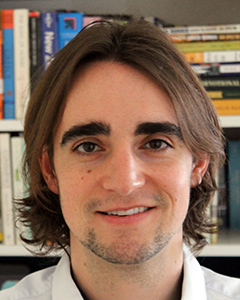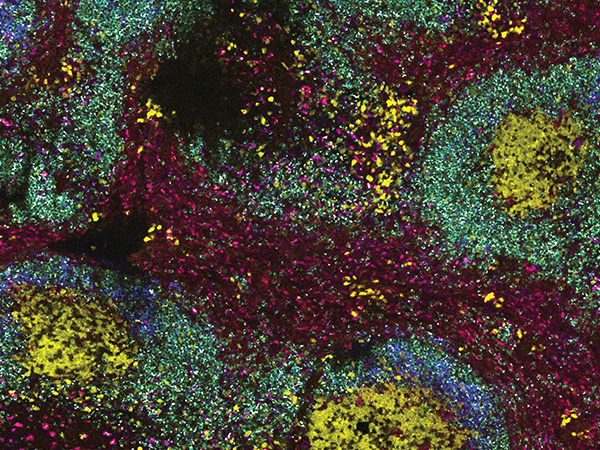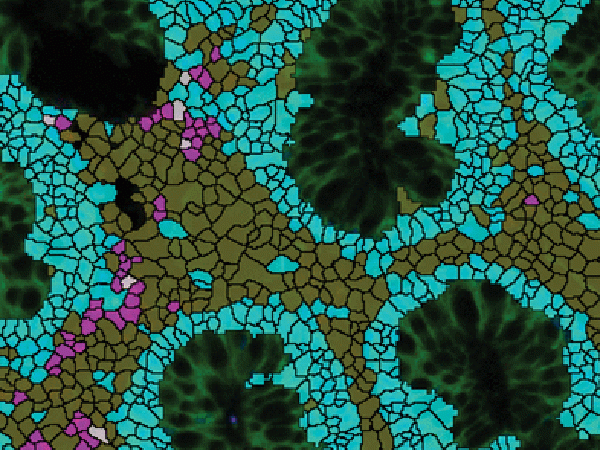On the Road to Better Pancreatic Cancer Treatments
November. A month of excitement as temperatures turn cooler and families gather to celebrate what they’re thankful for. But for some, November holds an even deeper meaning. This month marks Pancreatic Cancer Awareness Month, and for those affected by this disease, it is a time to remember those lost and honor those who continue to fight.
Pancreatic cancer is devastating, with a 5 year survival rate of only 6.7%—a rate which has not improved much in several decades. Amidst these dismal statistics, however, there is hope in the form of new and exciting research centered on understanding the biology of pancreatic cancer and using this knowledge to develop more effective treatment options.

Costas Lyssiotis, PhD, received a 2013 Pancreatic Cancer Action Network-AACR Pathway to Leadership Grant.
One of the scientists forging a path in this battle is Costas Lyssiotis, PhD, a 2013 Pancreatic Cancer Action Network-AACR Pathway to Leadership Grant recipient. The goal of Lyssiotis’ research program is to understand the unique metabolism of pancreatic tumors, and to discover new therapeutic targets that can exploit the dependency of these tumors on the nutrients that fuel their growth. “Pancreatic cancer is unlike other major solid cancers, perhaps most notably in how resilient it has proven to treatment strategies that have shown success in other diseases,” said Lyssiotis. “The riddle then is, what makes pancreatic cancer unique?” It is this puzzle that drives Lyssiotis and his research.
The Pathway to Leadership Grant provides $600,000 over five years to support the transition of young, mentored investigators to independent scientists. In his first year of the award, Lyssiotis has benefited from the mentoring provided by his principal investigator, Lewis Cantley, PhD, and his co-mentor, Alec Kimmelman, MD, PhD*. “I have had the good fortune of working with mentors that are truly passionate and inspired, as people and as scientists,” said Lyssiotis. “That sort of energy is contagious and invigorates your work.”
For Lyssiotis, working with Cantley and Kimmelman has also underlined the importance of collaboration to solve the toughest problems in cancer research: “My mentors, leading by example, have illustrated that cancer science in the big data era requires extensive collaboration. There is just too much data available, and cancer is just too complex and individualized, for a single individual or lab to decipher it. We have to play to our strengths and enlist those of others.”
In addition to scientific collaboration, this award has also given Lyssiotis an opportunity to establish relationships with pancreatic cancer patients, advocates, and supporters through his affiliation with the Pancreatic Cancer Action Network, something he values deeply. “These interactions really put a face on the devastating clinical reality of this disease,” he said. “They are also quite inspirational and a motivating force to think hard, to work harder.”
In the upcoming independent phase of his award, Lyssiotis anticipates holding a junior faculty position at a major cancer center in the United States. He intends to focus the research efforts of his lab on the study of pancreatic cancer metabolism and the development of novel treatment options to combat this disease, keeping in mind the importance of working together. “Beating cancer is a team effort,” according to Lyssiotis, “and is going to require collaboration at all levels, from basic biochemists at their bench tops to the clinical oncologists on the front line.”
Cover photo: Lyssiotis finishes a PurpleStride run in New York City.
*Lewis Cantley, PhD, is director of the Cancer Center at Weill Cornell Medical College and New York-Presbyterian Hospital. Cantley is a co-principal investigator on a 2014 Pancreatic Cancer Action Network-AACR Research Acceleration Network Grant (in memory of Skip Viragh), and program committee chairperson of the AACR Annual Meeting 2015. Alec Kimmelman, MD, PhD, is an assistant professor in the Department of Radiation Oncology at Harvard Medical School and in the Department of Radiation Oncology at the Dana-Farber Cancer Institute. Kimmelman was a recipient of a 2010 Pancreatic Cancer Action Network-AACR Career Development Award.



